Unknown Displeasures: Barely Legal
Anna Hollingsworth finds Barely Legal barely watchable

Film taglines are a fine art. Among the finer specimens we have Armageddon’s menacing 'Earth. It was fun while it lasted.', Ghostbusters’ evergreen 'Who ya gonna call?', the alliterative beauty 'The list is life' for Schindler’s List – and, as a bit of a black horse, 'They couldn’t rent it, so they filmed it themselves.' The tagline captures National Lampoon’s Barely Legal (2003) on several levels: not only does it summarise the entire plot in one sentence, but it is also very meta, because the film looks exactly like a group of 17-year-olds ‘filmed it themselves.’
Matt, Fred, and Deacon want sex because that’s what high school boys want, but unfortunately there’s none on offer to them. And because the way to get girls is money and power (maybe I should’ve included a trigger warning about perpetuating the gender binary and blatant sexism?), they decide that filming their own school-based adult entertainment (“for virgins, by virgins” as their marketing ploy) is the key to success. Cue stripper and aspiring porn star Ashley, and hey presto, the boys have their porno and Netflix viewers have, well, an unknown displeasure.
I wasn’t exactly expecting a deep exploration into the complexities of budding teenage sexuality, or into oppression in the adult entertainment industry, nor even a critical take on gender roles in a high school environment but the story line takes simplicity to a whole new level. The jokes – I like to think the film was intended as a comedy – are firmly established on the boobs–balls–bums trajectory; mind you, though, you only see examples of the first, as the lack of equal gender representation in Barely Legal is barely legal.
“The lack equal gender representation in Barely Legal is barely legal”
You might be mistaken to think that Barely Legal offers easy viewing, but following the story line actually takes a toll. The school nemesis of Matt, Fred, and Deacon pressures the trio to let him star in a sex scene. However, when time comes, he, well, comes, too, only a bit too early, leading to a tearful revelation that his essential male anatomy is on the dainty side of things and that he tends to get premature ejaculations (cue: laugh now). The more observant viewer is left pondering what made the poor boy aim for career in porn in the first place. An even more observant viewer might ask whether the ‘size is all that matters’ message is a healthy thing to portray in a teenage film – but then again, observant viewers are probably observant enough to steer clear from Barely Legal in the first place.
A disproportionate chunk of the unfortunately long running time of the film is dedicated to the trio arguing which of them should take up the newly freed acting role, before they hit the rather obvious conclusion that they could just recruit someone else. A big win for their intellectual capacity is a big loss of the viewer’s meaningful life time. That said, I wish my essay crises were resolved with the same ease; perhaps there’s market for ‘Saucy Supervisions’ or ‘May Bumping with Randy Rowers’ out there?
To its credit, Barely Legal is not the cringe-fest that it could be: when you don’t try too hard (hahaha, hard), you cannot fail to meet many expectations either. Take the acting: the casting is spot-on. The characters are written as one-dimensional stereotypes so the fact that the actors can all manage one facial expression is a perfect fit – generic sexy for Ashley, perpetually perplexed for Fred, and ‘he’s-the-hot-one’ for Deacon. It’s like watching a film where the cast is made entirely of Keira Knightleys: one expression fits all.
If you giggle at the word ‘willy’, Barely Legal will float your boat. I won’t judge if you do – I’ve been there. When I was about five
 News / Night Climbers call for Cambridge to cut ties with Israel in new stunt15 April 2024
News / Night Climbers call for Cambridge to cut ties with Israel in new stunt15 April 2024 News / Police to stop searching for stolen Fitzwilliam jade17 April 2024
News / Police to stop searching for stolen Fitzwilliam jade17 April 2024 News / Cambridge University cancer hospital opposed by environmental agency12 April 2024
News / Cambridge University cancer hospital opposed by environmental agency12 April 2024 Interviews / In conversation with Dorothy Byrne1 March 2024
Interviews / In conversation with Dorothy Byrne1 March 2024 Interviews / ‘It fills you with a sense of awe’: the year abroad experience17 April 2024
Interviews / ‘It fills you with a sense of awe’: the year abroad experience17 April 2024


